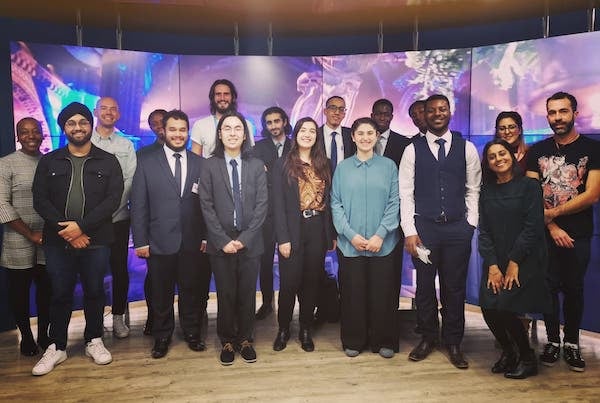
9 min read
You might be able to tell from my unusual job title that I am the Corporate Social Responsibility (CSR) person at Reward Gateway.
This is a pretty new thing for us. I’ve been with the business for a while, and we’ve always donated money to causes, supported our people when they’re fundraising and volunteered our skills and time to an array of charities. But, this is the first time we’ve put some structure and thought into it.
I’ve always found the intersection between commerciality and purpose really exciting — as a side project, I co-run a start-up clothing brand called WYNAD Clothing (shameless plug, I know!), which works with Fair Trade suppliers in India to make uncompromising, outspoken, ethical fashion.
Corporate Social Responsibility is a model designed to help organisations act in a way which benefits wider society as well as their bottom line.
While I sometimes feel that the term can be a bit stuffy-sounding, it’s a hugely important model that deserves to be taken seriously. With 64% of millennials stating they wouldn’t take a job if a potential employer doesn’t have strong CSR practices, those who fail to recognise the importance of this area to the modern workforce will get left behind. It’s a “must-have” for organisations looking to make an impact with their employees.
The most common way to think about CSR is the “three-pillar” model: Social, Environmental and Economic. A good CSR strategy should look to address each pillar in some way.
The best kind of CSR strategies are ones which have been crafted in collaboration with charities and community groups. They’re the ones developed by organisations who really understand their product, service and people, and can connect the dots to create genuine Social Value.
Discover how you can offer innovative perks to enhance Corporate Social Responsibility »
And while not every organisation may have someone dedicated to CSR like we do here at Reward Gateway, it’s critically important to have buy-in for CSR at the higher levels of leadership as part of your overall employee engagement strategy.
Lawrence Cramer, People and Culture Director for Inspired Villages, an organisation that develops and operates luxury retirement villages, is passionate about championing CSR at his organisation.
Like many HR leaders, he understands that your CSR strategy, whether that involves volunteering days, partnerships with foundations or investing in technology that lets employees give back to their favourite cause, adds to a company’s all-encompassing Employee Value Proposition (EVP).
“Giving something back – the ‘gift of time,’ provides our people with a sense of wellbeing,” Lawrence says, adding:
People want to know what our EVP is, they want to work for an organisation who make a difference to peoples’ lives. In our case, that of our employees and residents. It increases levels of engagement and productivity whilst also reducing levels of absence and attrition.
How we embrace corporate social responsibility at RG
Last September we created and registered RG Foundation, a grant-giving charity which supports organisations that are making the world a better, fairer, safer and more equal place to work. The Foundation’s focus is an extension of Reward Gateway’s mission to Make the World a Better Place to Work, which makes it an incredibly authentic way to engage our employees in the company mission in a deeper way.
In its first year RG Foundation has supported 11 organisations around the world with a total of about $630,000 AUD in grants that had been nominated by our own staff.
I was (and still am) part of the Foundation’s operational team, which meant I started having a lot of conversations with inspirational people doing incredible work to tackle some of society's most challenging issues.
One such example is the employability workshops coordinated by our friends at Working Chance - the UK’s only recruitment charity for women leaving the criminal justice and care systems. Volunteer days usually include a CV surgery; one-to-one interview practice; and confidence building around disclosures, often held onsite at one of the prisons Working Chance partners with. It’s a great example of impactful CSR as:
- Working Chance’s candidates benefit from an effective program designed to help get them work-ready as well as the opportunity to meet with potential employers in a variety of sectors.
- Our people benefit by developing their “soft-skills” and broadening perspectives of the working world.
- Working Chance benefits by increasing the hiring rate of their candidates, and building genuine relationships with corporations who care about their cause.
In fact, as a result of our first volunteering day with them, three RG volunteers nominated Working Chance for RG Foundation funding, and two months later they were awarded a $77,400 AUD grant.
Since then, we’ve been working hard to develop a CSR strategy with some serious bite, which are fuelling our Social Value Strategy 2020 (releasing early next year). Let’s take a look at my top tips to get started.
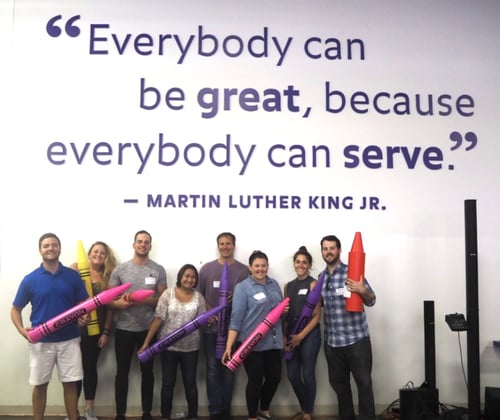
Four ways to improve an organisation’s corporate social responsibility strategy
| 1. Collaborate |
| 2. Lead by example |
| 3. Involve your people |
| 4. Get creative |
Collaborate: When approaching charities and community groups to see if there’s anything you can do together, it’s always best to take a collaborative approach. You might want to use your volunteer days to get your team together out of the office, but what if that doesn’t fit the needs of the charity? What if instead you have some skills that they could really use like marketing, sales strategy, people strategy or software development?
Whatever it is, don’t be prescriptive. Approach the conversation from a point of working together and adding some genuine value.
For more inspiration, reach out to other CSR professionals to spark conversation and ideas.
Lead by example: Like most things you do in your organisation, if you get buy-in from your Leadership Team you’re more likely to succeed.
I’ve been really lucky in the fact that our re-focused CSR strategy came directly from our CEO.
The fact that he, and the rest of our LT, are behind it means that I can approach ideas with an air of confidence and in the knowledge that this work is related to our business strategy and ultimately our plans for growth. It also means other people in the business are more likely to get behind the strategy.
If that’s not the case for you though, my advice would be to educate yourself. Get familiar with some of the numbers and data that point to the correlation between successful CSR strategies and more effective organisations. You can relate this to your industry so leaders understand it’s not just about recycling or one “do good” task, rather it should be a core part of your business strategy. (For starters, I love this book with impactful case studies).
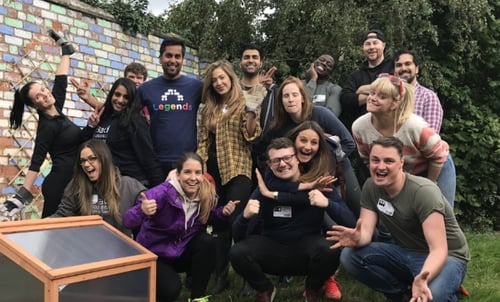
Involve your people: While having the Leadership Team backing is important, it’s just as important to include your people in this strategy from the beginning. Their engagement and participation will be where a lot of the value to the business comes from.
If you’re a multi-location, global business (like us) then this one poses a few challenges.
You can start by identifying champions in each location, who can help you to get a real understanding of the local bandwidth for opportunities, and of course help you to coordinate things on the ground.
This is a real opportunity for you to become a partner to lots of different departments and teams, wherever they’re based.
A huge win for us has been to tie the strategy into our company values framework. With values such as “We Are Global” and “We Speak Up,” our teams are already used to thinking about how we can collaborate remotely on projects and vocalise suggestions or ideas clearly to get the best result. However, it makes a lot of sense for us to align our CSR strategy closely with our “We Are Human” value, which teaches us to be kind in our interactions and think about how we can help others even if it’s not related to our job role.
This year we launched our first ever We Are Human Week, which coincided with the United Nations “International Day of Volunteering” on the 5th of December. The week brought a chance for our teams to celebrate this value together and embrace a culture of giving back whether that be through fundraisers, volunteering, donations or even just simply being more thoughtful of others.
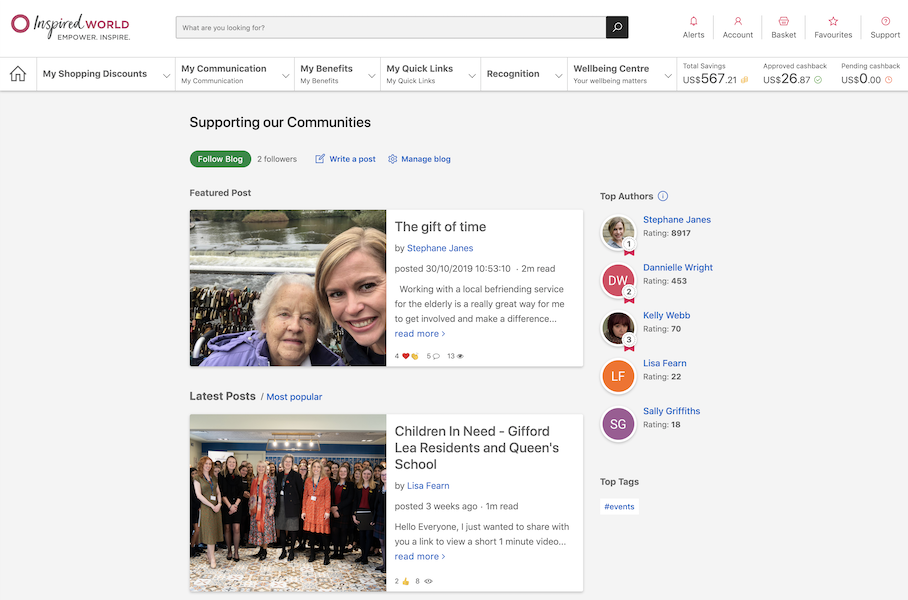
Lawrence works with his teams to create opportunities to build CSR at Inspired Villages, including showcasing them on the organisation's employee engagement platform through dedicated blogs and media. He says:
Many employees have given their time to residents within the village by taking them on walks, formed a choir with residents, performed walks with big issue, and slept on the streets to raise funds for homeless people.
“We held a 500-mile bike ride in May raising about $40k for MIND. Our charity for 2020 is Age UK when we will undertake the 500 mile bike ride again to raise funds for ‘loneliness’ which can happen to people at all ages.”
Get creative: Finally, (and this one’s probably my favourite) get creative in your approach to CSR and open your door to new ideas and ways of working. One of the most exciting things about this space is the potential for interesting projects that can have a real impact. Think about the sector your organisation exists in, and what you do, and work with some of your colleagues to see if your service can bend to deliver more social value.
For us, being in the tech space lends itself well to creativity, as products can be tweaked and adapted by our skilled engineers to fulfil changing needs. We’ve been able to use our own platform to communicate things like We Are Human Week, how many volunteering days have been used by our people, or how much money has been donated to causes globally.
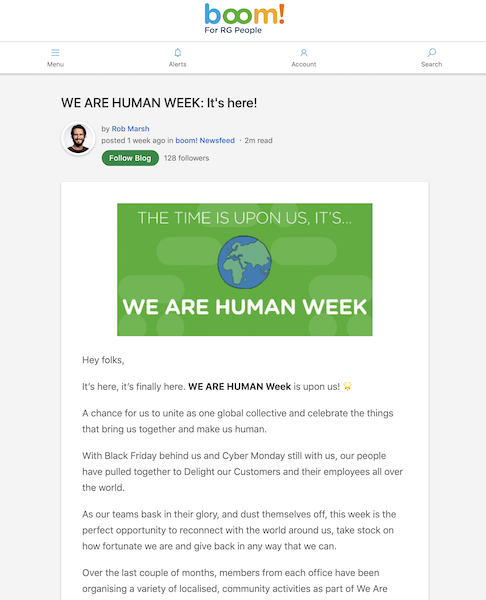
We’ve even started offering a selection of our products to smaller, Mission-aligned charities at zero cost. (If you’re interested, I can help you!)
In summary, if you’re not at least looking at CSR, or Social Value or Sustainability (whatever you want to call it) then you should be. If done in the right way it can contribute to more growth, more engaged employees, happier customers and a better world for everyone now and in the future. Surely that’s what this is all about.
And, if you’re an HR or CSR person that’s looking for ways to bring your people on board with this kind of work then give me a shout. Maybe we can come up with something new together.
 Rob Marsh
Rob Marsh

